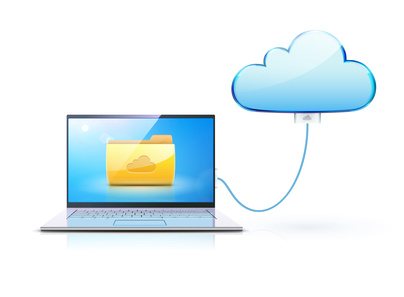What are the Risks of Cloud Services?
Through my company LandlordMax I hear lots of people asking if we have a cloud offering (in case you’re wondering, we don’t yet). The thing is that most people ONLY look at the benefits, very few look at the potential and catastrophic issues that you’re at risk of. For LandlordMax we use several online (cloud’ish) solutions, and it’s great for many things. The problem is that you also have to be careful because for some things the downside can be catastrophic! Even possibly terminal to your business! It can be much bigger than you realize and I’ll explain why in just a bit.
First, let’s make sure we’re on the same page about what cloud offerings really are. So what exactly is a cloud offering? Most people today have come to define a cloud service as a service that’s hosted online. Although not exactly right, it’s pretty close. And for the purpose of this post we’re going to define cloud services as all online services. In most cases these are just going to be websites that offer services. Again, although not technically correct, it’s close enough for today. And anyways this is what most people understand cloud services to be.
If you’re interested in the exact details, Wikipedia has a nice article about cloud computing. As well you’ll probably want to check out their article about SaaS (Software as a Service), which is actually closer to what people really mean when they say cloud services.
In any case, let’s start with the benefits, so we can understand why people are so interested in these solutions (including myself):
Benefits:
- Affordable: You don’t have to invest in any infrastructure, computers, etc., it’s all taken care of for you and amortized over time.
- Automation and Maintenance: You don’t have to manage any computers, servers, upgrades, etc. It’s all taken care of for you.
- Mobility: You can generally access the service anywhere there is an internet connection.
- Focus on core competencies: Instead of spending time setting up your infrastructure, computers, etc. you now have the time to spend on where your real value is.
- Scalability: Most online solutions will offer a significant amount of growth. You just move up plans. Amazon’s EC2 service recently had an amazing example where a system scaled up to 50,000 CPU cores within 3 hours.
- Easier: If you don’t have to set up anything. You don’t have to figure out how it works. It’s all done for you.
- Vendors are more experienced: In most cases, the service you’re using is the vendors bread and butter, they work in these systems all day, so they know their stuff in and out whereas for you it’s just to get the job done.
- Quicker: You can generally sign up and start using the solution within minutes. If you have to set it up, it can take days, weeks, or more.
- Less commitment: Maybe you only need the service for a month, half a year, etc., which means you can save from having to invest in a ton of infrastructure for a short lifespan.
As you can see, all of these are great benefits. Who wouldn’t want them? Especially for a smaller company, the benefits are incredible.
Of course, like everything else in life, you can’t have everything. Cloud services do come with costs. Not so much in terms of dollar costs, but in terms of very huge potential UNSEEN RISKS. This is especially true if you have to store data!
There are a few other cons, such as you can’t access your data without an internet connection, and so on. But really there’s really just one very big con, and unfortunately it’s generally unseen until it happens. That’s the worse kind of con! What’s worse is that most people don’t really talk about them, mostly because cloud services are still fairly new enough that most people haven’t really had a chance to experience this very big and potentially catastrophic con.
But before I explain it, let me give you an analogy that’s probably closer to home, and that you’re likely to have already encountered.
Most people store their pictures on their personal computer hardrives. Hardrives do fail. Google published a groundbreaking research report and the results were quite troubling. Basically you can expect drives to fail at a pretty predictable rate. And unfortunately it’s not just hardware failures that you have to deal with, all kinds of things can happen such as a virus corrupting your system, power surges, and so on.
In any case, before there were digital cameras, most people really didn’t have that much data, so all their really important data could usually be backed up on a CD or DVD (or if you’re old enough to remember this, floppy disks or tapes). It sucked to lose your saved video game files, or to have to install your applications again, but you usually could. Sure you’d lose some data, but usually it wasn’t that critical. Most important was generally backed up on floppies, CD’s, etc. because it was quick and simple.
Nowadays with everyone having a digital camera, there’s lots and lots and lots and lots and lots of pictures saved on people’s computers. Pictures they really don’t want to lose. The data is now much larger and generally more valuable. There’s so much data these days that in many cases you can no longer just back it up on a CD or DVD. But even at that, because of the quantity of data, most people just simply don’t do any backups at all, they expect their computers will just continue working. And computers usually just work until one fine day where it eventually fails and everything is lost. It’s terrible and catastrophic. Years of pictures lost in an instance!! It’s devastating. Yes there’s other data, but for a lot of people, their pictures are their most important data.
And so as cameras have become more common, we’ve started to experience more the pain of computer failures. And as such, it’s now much more common for the average person to have an external hardrive to backup their data. 5 years ago almost no one did this. Although not everyone still does this, it’s much more common. And its definitely going to be that much more common with time. We’re learning from our experiences. Once you experience it you vow never to let it happen again. It always takes that first time to wake people up, myself included.
I’ve been backing up prolifically since as long as I can remember because I’m one of the lucky ones to have experienced my first computer failures eons ago. And in 2006 I even wrote a post called 4 Simple Steps to Protect Your Data From 99.9999% of all Computer Failures which is still as true today as it was back then. I still mostly adhere to these steps, with the exception that I do even more today than I did back then
So why did I go on such a tangent with digital cameras and data backups, because when you use a cloud service to manage your data you’re basically exposing yourself to exact same risks!! You might not realize it, but with most online services you’re basically running without a net. There’s no backups. If anything happens, it’s the same as a computer failure with your digital pictures. And if the data is critical to your business, it could be catastrophic. What’s worse of all, there’s often no warning at all before it happens.
So let’s get into this con in much detail.
Cons:
For the cloud services you use right now, do you have a backup that you can use if they close down or you decide you want to move elsewhere? In most cases you have no way to extract your data at all, nevermind moving to another service. In those situations that you do, can you actually take that data file and use it anywhere else? Maybe in theory yes, but can you really in practice? If you can’t, then you might as well not have any backups at all. Why fool yourself into feeling more secure when you really aren’t. And this question leads us to some very interesting and provocative questions.
What happens if the company closes or decides to no longer offer their cloud service? All I can really say is good luck with that! Imagine for a moment that you have a contact management system and you have tens of thousands of contacts stored, with all their interactions, etc. The company that hosts the cloud services suddenly closes. What happens the day after the company closes? If it’s a service, the service is shutdown immediately. You’ve just lost all access to the system and your data overnight. Ouch!!
Online services that manage and store data have a lot of additional and very high risks. The scenario I just described is the same as if your hardrive just crashed and you just lost all your pictures and documents without any backups. However in this case, maybe your business relies on the data and system. It sucks to lose your pictures, but you can and will survive. Can your business survive? What is the impact on your business?
If it’s just a backup service of your data files, then it’s not a big deal, you can just re-create the backups with another service. Sure in the meantime you have no backups, but it’s quickly resolved. However if it’s all your customer and vendor contact information, communication histories, contract negotiations, etc., then the impact is going to be huge. What if you were using an online property management software system to manage hundreds or thousands of units and tenants and suddenly you have no access to anything. The impact could be severe enough to cause you to go bankrupt (you may not be able to properly collect your rents on time to pay all your bills, or even know what all your bills are)! That’s a huge risk. A risk that’s so large that it overshadows all the possible benefits!!
Which leads me to my next question, how much warning do you think you’ll get if the company hosting the cloud service closes? I can’t imagine a company that’s managing contacts, emails, projects, etc. publicizing that they’re on the brink of closing. Most likely you’ll have absolutely no warning. One day everything will be fine and the next day the system is down never to come back up. And to be quite honest, I don’t know that there’s much you can do to prepare for this anyways, even if they gave you a warning. How are you going to extract your data? What are you going to do with that data?
Following this, what happens if the service you’re using significantly changes it’s pricing model? It’s not uncommon for an online service to adjust their prices, there are many stories of significant increases in prices. Especially for newer companies, which most cloud based services are. Or better yet, what happens if the company gets acquired? Will the pricing models change? Other than paying what they want to charge you, what option do you have? Sure you can move, but can you really? What is the cost of transitioning?
And what will happen to the could service when it gets brought into the new company as part of an acquisition? Will it stagnate? For example Mint was acquired by Intuit in 2009 and a year later the comments weren’t that great. What if the new company is a competitor? Will they force you to transition to their service or you lose all your data? One of our big competitors has been doing this with the competitors they acquire. They’re basically closing the solutions they acquired and are forcing everyone to move to their cloud based solution. Not everyone is happy about this. It’s yet another very big risk of using a cloud service?
Which leads me to my next big question. Do you trust this company over the lifetime of your own company’s needs? In other words, will they offer the same quality of service in 2-5 years? What about in 10 years? If transitioning is next to impossible, which it is for most online cloud services, then you’re at their mercy. They could never upgrade or improve the service, or worse it could become slow, buggy, etc. with time. What recourse do you have other than completely starting over?
With a solution you install and manage, you don’t ever have to upgrade if you don’t want to. In fact, the company has a very strong motivation to improve their software because they generally only get paid when a new version that has enough value to upgrade is released. If it’s not good enough, people just don’t upgrade. And with time, the value of upgrades becomes more and more significant. In other words, the company’s motivations are probably much more inline with yours when they aren’t cloud based. They need to convince you spend more money on them, that the value is worth it.
Conclusion
Unlike pictures where it would really suck to lose Johnny or Susie’s 1st birthday pictures, the impact to your losing your data could be so significant as to destroy your business. I’ve already given a couple of examples, and it’s pretty easy to come up with additional ones. Basically anywhere you store data that’s critical to your business is at high risk.
Therefore I would now recommend you look at what services you use and determine what the costs would be if they suddenly went down tomorrow. Is that cost worth the benefits? In some cases yes, absolutely, but in other cases no way would you ever even consider it if you had thought about it first.
The thing is that today most online services are still fairly new, and most really haven’t had the chance to close. Although cloud computing isn’t new, it’s really only been in the public’s attention for a short time. And as such very few people have experienced the downside. If I was to guess, I would suspect that most like you haven’t either.
I’ve personally only experienced it once, and it wasn’t with one of our core products, but even then it was pretty painful. I learned my lesson. Never again. And thankfully it wasn’t a service that’s core to my business. And because of that I’ve since been very careful with what online services my company uses.
Anything that can severely cripple us has to be done internally. It has to be installed and managed internally. This doesn’t protect us 100%, but what it does offer us is a buffer. If something happens we have some time if the company closes, collapses, changes, etc. We can at least still continue to use their software until we find an alternative solution, even they don’t exist anymore. We can’t use them indefinitely, but we do have some time to transition to another system. We might not be able to transition the data, but at least we can continue to access the old system if need be. And because we have some time, we can always hire someone to help us in moving data from one system to the other, even if it’s manual data entry. The key is that we at least have options. And most importantly that we’re not without our system overnight.
And with that, I will say that my company probably uses close to a dozen online cloud services. Am I a hypocrite? Am I willing to take those risks? Absolutely not. Each service we use would not cripple us if they closed tomorrow. It wouldn’t be fun if they went down, but it definitely wouldn’t be catastrophic either. There’s only one online service we use which I’m planning to push to an internally manage solution sometime this summer. It also wouldn’t be a catastrophic loss, but it would definitely be more painful than the others. It’s the only solution left with data that we’d need to extract that we wouldn’t be able to. However if we lost the data, it wouldn’t be catastrophic. It wouldn’t be pleasant either, but we could manage without too big a hiccup.
To give you an example of solutions we manage outside, internally we communicate using HipChat. Well at least until last month, before that we were using Campfire. Obviously we were able to transition because we’ve already done it. Losing either of these services overnight wouldn’t be fun, but neither would really slow us down much. They’re very useful and do increase our productivity internally, and losing the chat histories would have some costs because some info would have to be re-communicated, but as I’m sure you can appreciate, the exposure is pretty minimal compared to the costs and risks.
Another example is that we use Aweber to manage our company newsletter. Before I begin, let me just start by saying I chose them because of their reputation and my belief that they aren’t going anywhere anytime soon. In any case, if something happens, yes we’ll lose the latest email subscribers since our last local backup. That’s a cost, but really it’s not that big a deal. Yes we’ll lose our stats over time. They were nice, but we can live without them. The biggest pain would be importing the mailing list with a new service. Most likely all our subscribers would be emailed to confirm and verify they want to be subscribed to the new service managing the newsletter. So as part of this effort, we’ll probably lose a percentage of our subscribers. It’s not pleasant, but by no means is this catastrophic. We can definitely recover.
If however I was a real estate investor, or a property management company managing properties for others, losing all my data could be extremely catastrophic. All of sudden I no longer know which tenants owe me what amount of money (rents, back rents, damages, late fees, etc.). I now have to find all the signed lease agreements and go through that manually just to calculate this month’s rent roll. If I have 300-500 tenants, I might not be able to process all that information in time (I might have 5000 tenants on file but only 500 are currently active). What about all the workorders I have on file, all that information goes away. In some cases a request to fix a leaky sink can just be re-requested by the tenant, but what if a workorder is critical and it gets lost (for example a vacant unit needs a roof repair otherwise it will collapse, a leak that goes unchecked escalates, etc.). If I’m a property management company, I might have obligations on when I need to pay the property owners their rental revenues so they can meet their mortgage obligations, but if all my information is gone, I might not have the time to manually process everything. And when I do find a new system, in this example I now have to enter 500 units worth of data, 500 tenants contact info, 500 leases, etc. How long will that take? I might not be able to survive the 1-3 months it takes me to recover from my online cloud service disappearing on me overnight.
Using an online solution in the above example could be very catastrophic. In this case the risks just aren’t worth the benefits. In this case you’d most likely want to acquire a system which you can manage internally, so that if the software company closes, decides to stop selling the software, gets acquired, changes prices, etc., you can still continue using their software until you find a proper replacement. Otherwise you could come in to the office one day to find yourself in a world of hurt.
Online and cloud services can be very beneficial. They definitely have their merits. We use many such cloud services here within LandlordMax. However you always have to be vigilant in terms of what and how you use them. They really only have one con, bit it’s a whopper of a con! Which is that your data is at their mercy. You generally don’t have backups or anyway of transferring it. So always, and I mean always, make sure that a permanent disruption of the cloud service you’re looking to use isn’t going to destroy you. And if you’re already using it, then you should already start to make preparation plans just in case the worse does happen. Don’t wait until it’s too late because by then it will be too late!







· August 13th, 2012 · 3:54 am · Permalink
Hi Steph,
Thanks for your article, very insightful. I must admit that your points now make a lot more sense reading through the various pros and cons.
I think the cons technically outweighs the pro. Now, I think I am doing to have to change my mind and stop searching for online hosting app.
Regards.
· June 4th, 2013 · 3:51 am · Permalink
One more issue : when you backup data from cloud services,[and the co. is closed] when you try to restore the backup you will get surprize, you need to have a same setup of what was threre at cloud services.
best method : go multipal cloud
· June 21st, 2013 · 9:20 pm · Permalink
That’s a very good point. Often the data you backup is not useful unless it’s an industry standard, which is rarely the case. At least not without all kinds of effort and custom work which would be more costly than just re-entering the data.
The key is that online cloud services can be great for some things, you just have to be careful when it comes to critical data. In those cases you want to own and manage the software AND data yourself.
· June 27th, 2013 · 7:58 pm · Permalink
[…] to rehash the past, but I wrote a previous post called What are the Risks of Cloud Services? I explain when it’s good to use hosted services and when it isn’t. They have a time and […]
· July 3rd, 2013 · 4:52 am · Permalink
[…] Today’s post is more for the people who follow this blog by email, those who have subscribed to the email newsletter to receive emails of the posts. Basically the recent closing of Google Reader has made me realize I can’t hold off moving away from Feedburner any longer. It’s pretty clear that Feedburner is on it’s last leg and that Google will drop it shortly. Another example of some of the risks of hosted services. […]
· July 4th, 2013 · 9:00 pm · Permalink
[…] Today’s post is more for the people who follow this blog by email, those who have subscribed to the email newsletter to receive emails of the posts. Basically the recent closing of Google Reader has made me realize I can’t hold off moving away from Feedburner any longer. It’s pretty clear that Feedburner is on it’s last leg and that Google will drop it shortly. Another example of some of the risks of hosted services. […]